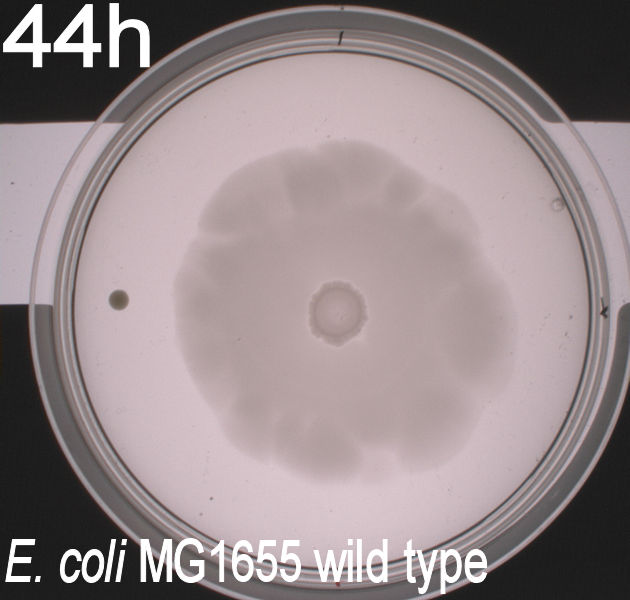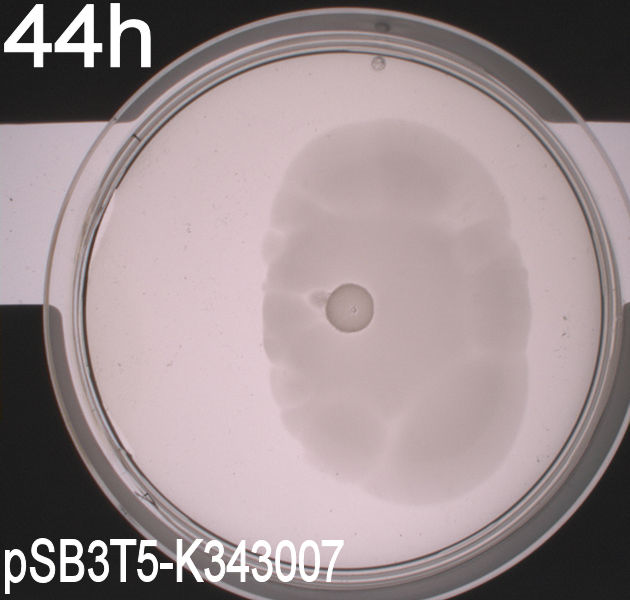Activities
Presentation for high school students
On April 14th, a few of us held a short but enthusiastic presentation about our participation in the iGEM competition. Our audience: a bunch of high school students.
At the moment, we didn't really have a clear idea about what direction our project would take us in, so we mostly talked about iGEM and synthetic biology on a more general level and the ethical and safety related issues that must be adressed in all synthetic biology.
Nobody fell asleep and they even laughed at our jokes, so all in all, we believe we did a really good job!

Local TV interview by TV2Fyn
On the 25th of April the local news channel, TV2Fyn, presented a short program about synthetic biology in Odense. The focus was on the creation of artificial life and the ethic aspects related to this field of research. They talked to the head of the FLinT Center, Steen Rasmussen, and a few other smart people, including us! It's all in Danish so you'll have to trust that Mike and Jacob said some very clever things. If you should like to watch us anyway, you can do so [http://www.tv2fyn.dk/article/227758?autoplay=1 here].
He followed us in some of our daily work in the lab and it was a great opportunity to speak to the broad public about iGEM and, of course, free publicity is never a bad thing!

European workshop in Paris
In early June, we crammed ourselves into two of the university’s cars and drove off to Paris. 16 hours later we arrived in the dead of night, a bit droopy-eyed, to our hotel. After a few hours’ sleep, we ventured out into the Parisian traffic yet again to reach the European iGEM conference.
Here we spent two days learning a lot of interesting and important things about the history of iGEM and synthetic biology, how to come up with an idea and, very importantly, how to tame, use and expand the parts registry. Lars Christian got so excited that he live-blogged the whole thing! Read it on our blog [http://igem.sdu.dk/?p=589 here] (and in the subsequent 12 entries!)
Apart from a mother lode of practical information, the conference also offered great food and a unique opportunity to intermingle with the other European teams. This is where we met our friends from the Bielefeld team amongst many, many others and, in short, had an amazing time!

Radio interview by "Harddisken" (The Hard Disk Drive)
On June 16th we featured on the national Danish radio program [http://www.dr.dk/harddisken/om-harddisken/harddisken-in-english/ The Hard Disk Drive]. It’s a 1 hour technology program focusing on the impact of new digital technologies on the society, our culture and our daily lives.
The program first aired in 1994 and is one of the longest running shows on Danish radio.
The program we participated in deals with synthetic biology because of its fast development and its dependency on computing power to perform sequencing, modelling and other analytic tasks. Thinking of cells as pieces of electronics like in the iGEM competition also intrigues The Hard Disk Drive.
Andrew Hessel from the singularity university in California was the first to be interviewed, he talked about the technological development in synthetic biology and how computers are used in synthetic biology.
After the Andrew Hessel interview, we presented our project talking about how we would model the bacteria function and the dangers of loading new applications into the bacteria.
Listen to the entire radio program [http://www.dr.dk/P1/harddisken/Udsendelser/2010/06/16151804 here].
Science Camps
About a week after the new students start their long years of university study, they go for a weekend trip with their social tutors. These weekends are called Science Camps, but are mostly about being drunk and naked. In an attempt to save the poor first-year students' souls, we went out and told them about the iGEM competition and our project, thereby bringing the science back to the Science Camps! We also gave them a genetic rebus where they had to translate a gene sequence to amino acid one letter code. The result was the slightly misleading message "IGEM TIME IS PLAY TIME"!
These bright minds of tomorrow, however hungover, seemed interested enough and we were met by a positive atmosphere.There is hope yet for SDU in the future iGEM competitions!

Visit by the Bielefeld iGEM team
On September 24th-26th, we were visited by the Bielefeld iGEM team! Those are some really great guys, and we had loads of fun with them! On the first afternoon, we took them to our Friday Bar and tried to beat them in a drinking game known as Kævle, but of course we lost. After all, they’re Germans. In the evening we had pizza, beer and some great laughs, and they even brought us some really cool gifts from Bielefeld! We played MarioKart against them on our old Nintendo 64 but sadly, we lost again.
The next day was a bit more serious, at least in the beginning. We had a meeting where each team presented their project to the other and was praised and criticized. Of course both teams had room for improvement, so we all benefited from this.
Afterwards, we took them on a phallus walk in Odense, showing them some of the abundant references to the male sex that can be found scattered about the city!
We are very happy that they took the time to come and visit us, and we hope to visit them sometime in the fall.

Article in "Ingeniøren" (The Engineer)
On Friday October 1st the Danish magazine The Engineer published an article about us!
Below you'll find a translation of the article and a link to the original story. Press [http://ing.dk/artikel/112574-studerende-satser-paa-guld-for-syntetisk-e-coli-der-flygter-fra-blaat-lys this link] to read the original article in Danish.
Students aim for gold for their synthetic E. coli, that flees from blue light
Students from the University of Southern Denmark are currently developing a phototaxic bacterium that converts light into mechanical work.
By Robin Engelhardt, Saturday 02 October 2010 pm. 11:00
A team of bioengineer students from the University of Southern Denmark is getting ready for the annual iGEM competition to be held at MIT in Cambridge, USA, on November 5th-8th. They have created an artificial E. coli bacterium with a photo sensor which causes the bacterium to move away when you shine blue light on it.
There are still a few things missing, says instructor Mike Barnkob, but he is confident that they have a good project: "E. coli bacteria have some flagella they can flap. We found out that you can control them by combining genes from other bacteria and then expose them to light. Blue light causes them to turn about and if it is dark in a different direction, they move there."
The team from the University of Southern Denmark have just got the first proof that the system works and they are now conducting further characterization to see what types of light it responds to, and how quickly they can get the bacterium to move.
The pictures below show two petri dishes, a normal and a synthetic bacterial culture, respectively. Both have grown for 44 hours, and both have been half covered. One can see how the manipulated culture moves towards the dark area.
The idea is at some point to be able to create a flow in a micro tube by coating the tube with a layer of the new type of E. coli.
“It has actually proved to be a problem to mix liquids properly in very small areas,” explains Barnkob.
“By adding the bacteria, they can whip the liquid with their little tails, which means that you can control how liquids mix in small micro-tubes.”


Great interest
iGEM is short for International Genetically Engineered Machine and allows students from universities around the world to participate in the emerging field of synthetic biology, which is sometimes also called the do-it-yourself biology.
The competition has been held since 2004, and Denmark has been represented by two teams since 2009 - one from The University of Southern Denmark and one from the Technical University of Denmark.
“What we thought was really cool about this project, is the principle of converting light energy to mechanical energy by shining light on a bacterium,” says Barnkob.
“The important thing about iGEM is getting to grips with the biological programming language and find out what you can do with it and what you cannot.”
Over the past six years, students have built so-called BioBricks that make up the foundation for programming biological organisms, which range from bacterial cameras and bio-beer to biological landmine detectors.
Last year the students from Univerity of Southern Denmark made a bacteria-filled bandage that ensures a better supply of antibiotics to a wound. The team from the Technical University of Denmark got a gold medal in 2009 for the design of a ‘redoxilator’ that emits a green glow when the bacterial metabolism is high and ready for production.
“I will say, in all modesty, that we’ve got a super team with 14 students from physics to biomedicine, molecular biology and medicine to philosophy,” says Barnkob from the University of Southern Denmark.
“Of course we hope to win gold in Boston. Last year we got bronze, and this year we believe that we can make it a lot further.“
Nordic iGEM meeting
This year, our instructor Mike took the initiative to arrange a Nordic iGEM mini conference! Sadly, none of the Swedish teams were able to come, so in the end it was only us and the team from the Technical University of Denmark (DTU). We came to them and had some great lunch before we presented our respective projects. At the time, their presentation was vastly better than our own, but there’s time to change that yet!
After a very long but productive day, we were awarded with an abundance of delicious Chinese food and we spent a very pleasant evening in their company.

http://igem.sdu.dk/wp-content/uploads/sponsor-sdu.png http://igem.sdu.dk/wp-content/uploads/sponsor-fermentas.png http://igem.sdu.dk/wp-content/uploads/sponsor-dnatech.png 
 "
"








